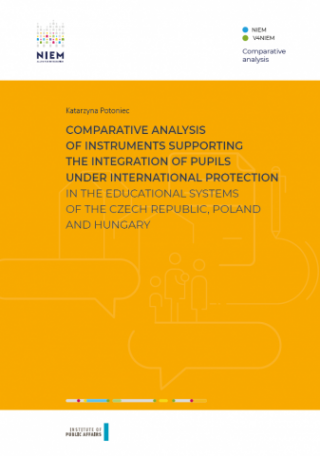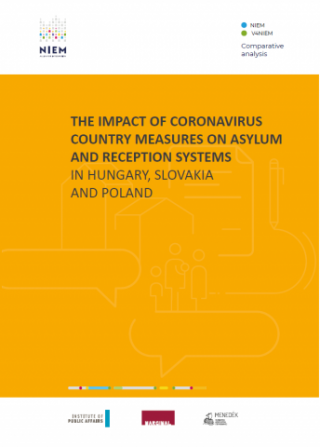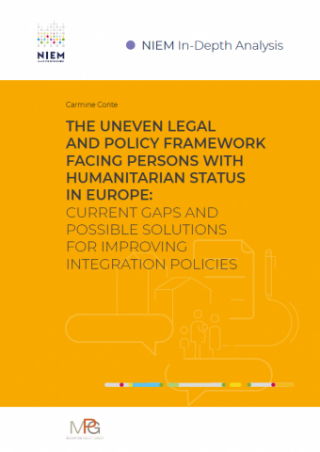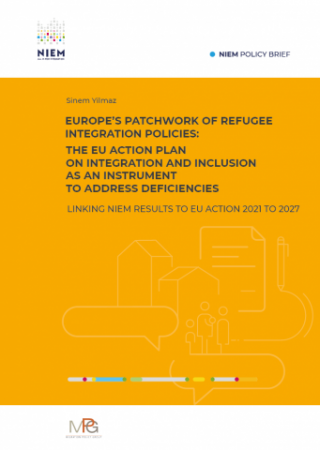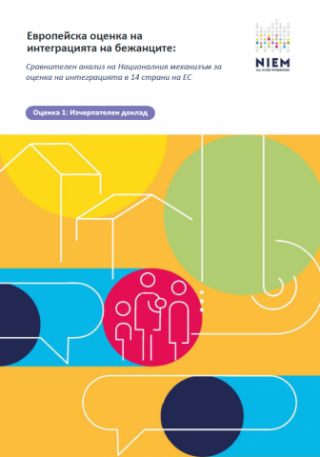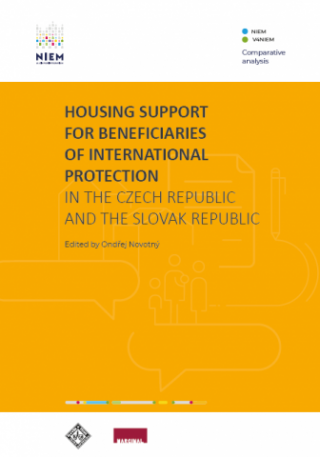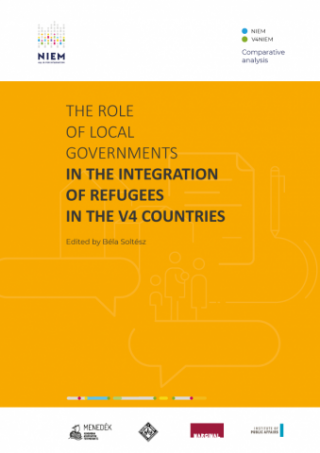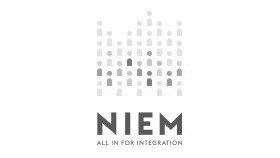
Evaluation 2. National Reports
- Интеграцията на бежанци в България 2021: Всеобхватен мониторингов доклад.pdf
- Integration of beneficiaries of international protection in the Netherlands: Third set of results from the National Integration Evaluation Mechanism (NIEM).pdf.pdf
- National Integration Evaulation Mechanism National Report on Hungary. 1 January 2020 - 24 February 2022.pdf
- Εθνικη Εκθεση Για Τον Μηχανισμο Αξιολογησησ Τησ Ενταξησ Των Δικαιουχων Διεθνουσ Προστασιασ Ελλάδα 2022.pdf
- National report on the evaluation mechanism of the integration of beneficiaries of international protection Greece 2022.pdf
- Latvian integration system 2019 – 2021: Stagnation before positive change?.pdf
- Latvijas integrācijas sistēma no 2019. līdz 2021. gadam: stagnācija pirms pozitīvām pārmaiņām?.pdf
- Integrace držitelů mezinárodní ochrany v ČR.pdf
- Informe nacional para España, NIEM 2022. Sobre el sistema de acogida e integración para solicitantes y beneficiaries de protección internacional.pdf
- National Integration Evaluation Mechanism Slovenia. Report for 2020–2021.pdf
- Mehanizem za evalvacijo integracije Slovenija. Poročilo za obdobje 2020–2021.pdf
- Évaluation des politiques d’intégration en France entre 2020 et 2021.pdf
- Raport de evaluare a sistemului național de integrare a benficiarilor de protecție internațională.pdf
- Beneficiari di protezione internazionale ed integrazione in Italia. Normative, politiche, numeri e sfide.pdf
- Beneficiaries of international protection and integration in Italy. Regulations, policies, data and challenges .pdf
- Integracja uchodźczyń i uchodźców w Polsce – niemal równe prawa, nierówne szanse. Raport krajowy 2020.pdf
- Measuring refugee integration policies in Sweden – Results from the National Integration Evaluation Mechanism 2021.pdf
- Pabėgėlių integracija Europoje – atsakingas požiūris. Projekto „Nacionalinis Integracijos Vertinimo Mechanizmas“ (NIEM) nacionalinė ataskaita (III).pdf
Comparative analysis of instruments supporting the integration of pupils under international protection in the educational systems of the Czech Republic, Poland and Hungary
This study analyzes the educational situation of students with refugee experience in three countries: the Czech Republic, Poland and Hungary. What is presented within its framework are the educational systems of individual countries in the scope of educating children under international protection and asylum seekers and the instruments supporting integration and educational policies of a given country towards the integration of this group of students. The main challenges faced by the educational systems of individual countries are also discussed and - due to the time of preparing this analysis – there is a description of the situation of students with refugee experience during the COVID-19 epidemic. The summary formulates the basic conclusions drawn from the comparison of the situation in the Czech Republic, Poland and Hungary, along with recommendations for the educational policies of these countries.
- Comparative analysis of instruments supporting the integration of pupils under international protection in the educational systems of the Czech Republic, Poland and Hungary.pdf
- Analiza porównawcza instrumentów wspierających integrację uczniów objętych ochroną międzynarodową w systemach edukacyjnych Czechach, Polski i Węgier.pdf
The impact of coronavirus country measures on asylum and reception systems in Hungary, Slovakia and Poland.
The current analysis focuses on the impact of the coronavirus pandemic and measures the national governments implemented with the aim to manage the health crisis on asylum and reception systems in Hungary, Slovakia and Poland. The authors provide an overview of the countries’ asylum and reception systems and their functioning under the general COVID-19 preventive epidemiological measures. Due to the dynamic changes related to epidemiological situations in selected countries, the current analysis relates to the period from March 2020 until July 2021. While the crisis situation was present in Autumn 2021, awareness of systemic challenges and inequalities is important in order to maintain procedural guarantees during the asylum procedure, provide appropriate solutions and safeguard the wellbeing of asylum seekers in the region.
The uneven legal and policy framework facing persons with humanitarian status in Europe: Current gaps and possible solutions for improving integration policies
This report presents key 2019 data as they are reflected in the scored outcome of research conducted in the 10 assessed countries; shows general results regarding legal and policy indicators pointing out the main trends and weakness across all the countries; presents in detail key results in three macro-dimensions analysed (legal-status integration, socio economic and socio cultural integration).
Europe’s patchwork of refugee integration policies: The EU Action Plan on Integration and Inclusion as an instrument to address deficiencies Linking NIEM results to EU action 2021 to 2027
This MPG policy brief investigates to what extent the refugee integration policies analysed in NIEM are in line with the principles, values, and objectives of the EU Action Plan on Integration and Inclusion (2021-2027). Policymakers and stakeholders may identify areas in which the EU Action Plan can help to address policy gaps and needs. Using NIEM results can also help to assess the success of the Action Plan in the coming years. Specific recommendations to the European Commission and Member States suggest how to foster the implementation of the Action Plan and make it more effective.

NIEM policy briefs
The ten analyses, written by experts and professional partners of the Menedék Association, provide a detailed overview of the social integration of beneficiaries of international protection living in Hungary, as well as the situation in specific policy areas, and formulate policy recommendations. The analyses have been produced within the framework of the V4NIEM sub-project of our National Integration Evaluation Mechanism (NIEM) project.
- 1. Németh Ádám: Az adathiányok kezelésének és értelmezésének lehetőségei a nemzetközi védelemben részesített személyek társadalmi beilleszkedésének vizsgálata során.pdf
- english version - Ádám Németh: Interpreting data gaps in the study of the social integration of beneficiaries of international protection in Hungary.pdf.pdf
- 2. Nagy- Nádasdi Anita Rozália - Kiszolgáltatottság és diszkrimináció a nemzetközi védelemben részesített személyek foglalkoztatása során.pdf
- english version - Anita Rozália Nagy- Nádasdi: Vulnerability and discrimination in the employment of beneficiaries of international protection in Hungary.pdf
- 3. Budai Boglárka: Nemzetközi védelemben részesített személyek munkaerőpiaci helyzetének változása a covid-19 járvány nyomán.pdf
- english version - Boglárka Budai: Effects of the covid-19 pandemic on the labour market situation Of beneficiaries of international protection in Hungary.pdf
- 4. Pósfai Zsuzsanna - Szabó Linda: Szakpolitikai elemzés és javaslat a nemzetközi védelemben részesített személyek lakhatásának javítására.pdf
- english version - Zsuzsanna Pósfai, Linda Szabó: Policy analysis and proposal for the improvement of the housing of beneficiaries of international protection in Hungary.pdf
- 5. Tóth Judit: Az egészségügyi ellátáshoz való hozzáférés problémái nemzetközi védelemben részesített személyek esetében - elemzés és javaslatok.pdf
- english version - Judit Tóth: Access to healthcare for beneficiaries of international protection in Hungary – analysis and recommendations.pdf
- 6. Sos Sára: Erőforrások és stratégiák a nemzetközi védelemben részesített muszlim nők sikeres társadalmi beilleszkedésében.pdf
- english version - Sára Sos: Resources and strategies for the successful social integration of muslim women granted international protection in Hungary.pdf
- 7. Bognár Katalin – Hetzer Kata: Nemzetközi védelemben részesített tanulók iskolai integrációjának módszertana.pdf
- english version - Katalin Bognár, Kata Hetzer: Methodology for the integration of beneficiaries of international protection in hungarian public education.pdf
- 8. Faludi Julianna – Lakatos Zsombor: Nemzetközi védelemben részesített személyek felsőfokú tanulmányainak támogatási lehetőségei.pdf
- english version - Julianna Faludi, Zsombor Lakatos: Opportunities for supporting higher education studies of beneficiaries of international protection in Hungary.pdf
- 9. Németh Ádám: A menekültekkel kapcsolatos társadalmi attitűdök alakulása Magyarországon.pdf
- english version - Ádám Németh: Changes in social attitudes towards refugees in Hungary.pdf
- 10. Gerő Márton: Önsegítő menekültek? A nemzetközi védelemben részesülők és bevándorló hátterű csoportok részvétele az integrációs folyamatban.pdf
- english version - Márton Gerő: Self-helping refugees? The role of organisations of beneficiaries of international protection and immigrants in Hungary.pdf
Европейска оценка на интеграцията на бежанците: Оценка 1: Изчерпателен доклад Сравнителен анализ на Националния механизъм за оценка на интеграцията в 14 страни на ЕС
Housing Support for Beneficiaries of International Protection in the Czech Republic and the Slovak Republic
This publication, prepared in the framework of the V4NIEM project by authors from Czech and Slovak Republic, gives a glimpse into the workings of national housing support mechanisms for beneficiaries of international protection in both countries. It elaborates on the advantages as well as systemic shortcomings of each country’s mechanism, describing not only the particulars of targeted and mainstream support, but also the wider challenges of systemic housing issues.
The role of local governments in the integration of refugees in the V4 countries
This analysis, developed in the framework of the V4NIEM project by authors from all four countries, endeavors to give an overview of the possibilities and limitations of local authorities in the topic of the integration of beneficiaries of international protection . It continues the comparative approach set by the project’s previous publication, “Asylum Seekers and Beneficiaries of International Protection in V4 Countries (Updated Report)”, issued in 2019. The focus is on local level policies related to beneficiaries of international protection. The “local” level is understood, most importantly, as municipal administration (LAU), however, reflections about the regional levels (NUTS2 and NUTS3) are also added where relevant.


